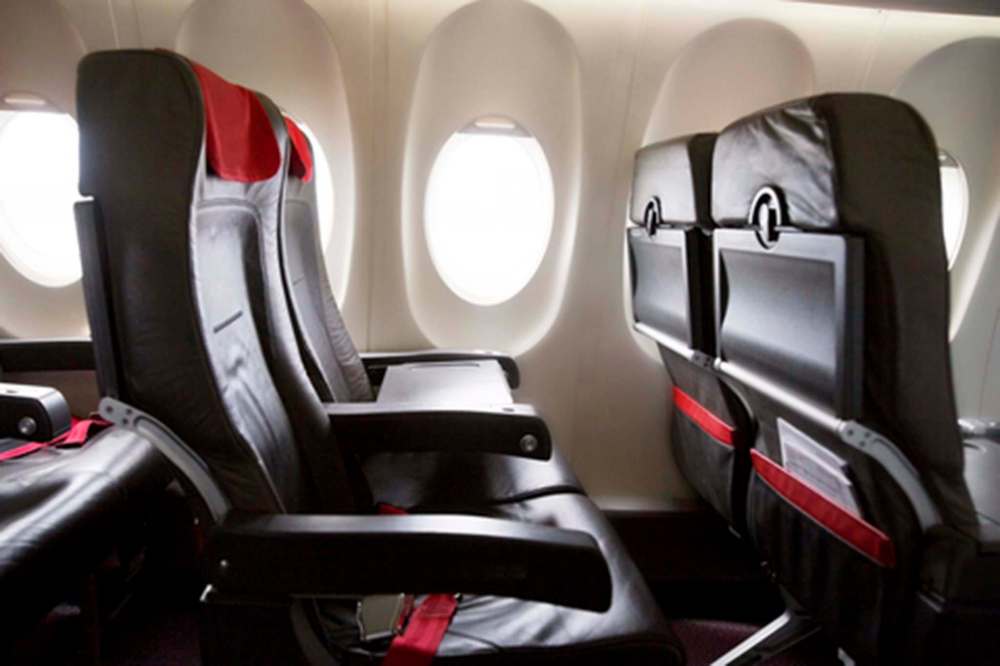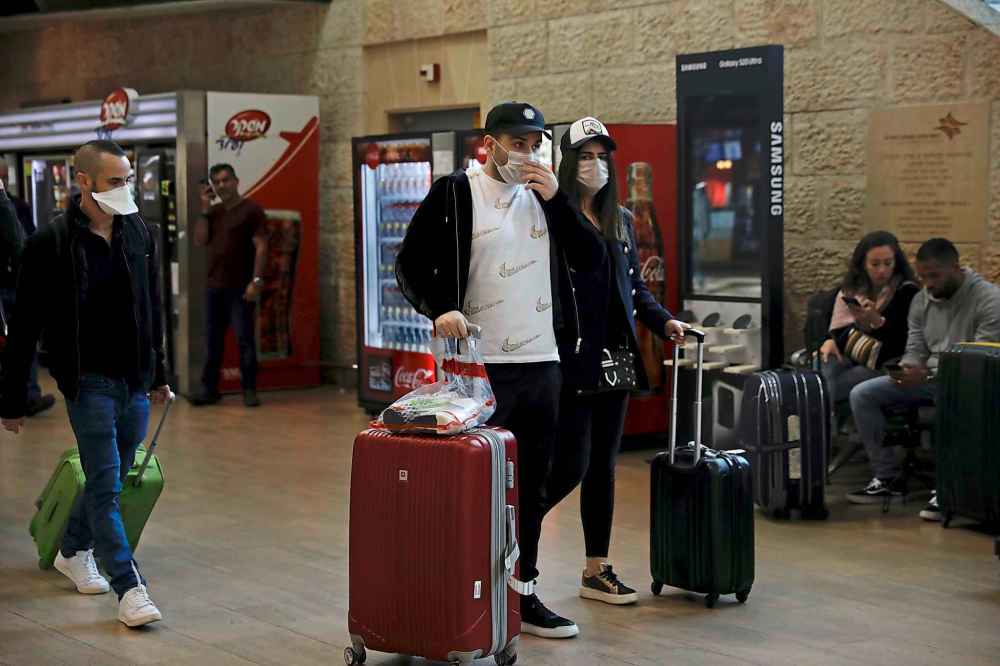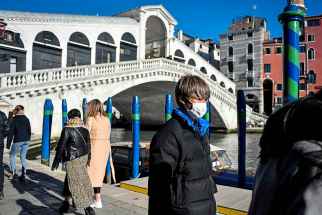Disease takes no vacation Spring-break travellers are wary of coronavirus outbreak, but ordinary illnesses are more likely to ruin your holiday
Read this article for free:
or
Already have an account? Log in here »
To continue reading, please subscribe:
Monthly Digital Subscription
$1 per week for 24 weeks*
- Enjoy unlimited reading on winnipegfreepress.com
- Read the E-Edition, our digital replica newspaper
- Access News Break, our award-winning app
- Play interactive puzzles
*Billed as $4 plus GST every four weeks. Offer only available to new and qualified returning subscribers. Cancel any time.
Read unlimited articles for free today:
or
Already have an account? Log in here »
Hey there, time traveller!
This article was published 28/02/2020 (1831 days ago), so information in it may no longer be current.
Spring break is in the air and the Winnipeg Richardson International Airport is gearing up for one of the busiest travel weeks of the year.
The city airport expects to see about 10,000 additional travellers during the provincial school vacation — which runs from March 30 to April 3. Public health is of greater concern during the annual influx this year, owing to the international outbreak of novel coronavirus, known as COVID-19.
“We’re certainly monitoring it very closely and we have some digital ads in the airport reminding people about their obligations and responsibilities if they are sick or if they have been travelling in those areas to self-report,” says Tyler MacAfee, vice-president of communications and government relations for the Winnipeg Airports Authority. “We’ve really been (following) the lead of the public health agency on this.”

As of Feb. 26, the risk of contracting COVID-19 was low for Canadians. According to Health Canada, there have been 12 confirmed cases in the country to date, five in Ontario and seven in British Columbia.
“It’s a bit of a wild card right now because there’s so many unknowns and the virus is still finding its way and as it (does) will continue to spread,” says Dr. Pierre Plourde, a medical officer of health with the Winnipeg Regional Health Authority and a specialist in infectious diseases and tropical medicine.
Plourde advises wary travellers to avoid visits to areas with active travel health notices — which include China, Hong Kong, Iran, Japan, northern Italy, Singapore and South Korea — and says surgical masks should be on the packing list for those headed to a region with reported cases of the virus.
“If it’s prudent or you’re given advice to put one on and they don’t have enough to distribute, it would be nice to have your own supply handy,” he says. “You don’t need fancy masks — you just need the ordinary surgical or procedure masks that you can find in pretty well any pharmacy or medical supply shop.”
However, the health risks are a lot less novel for most Manitobans going away this month.
Traveller’s diarrhea, diseases transmitted by insects and heat-related illnesses are much more common ailments for those headed to hot destinations. According to WestJet, Mexico and Caribbean countries are the top getaway locales for Manitobans during spring break, none of which have reported cases of COVID-19 to date.
Plourde says the main reason people get sick while travelling is by behaving as they would if they were at home. Drinking the tap water and forgetting to protect against bugs are two examples that can lead to trouble.
“The stakes are different elsewhere. The tap water can make you very, very sick — even just brushing your teeth with it — and an insect bite could definitely make you very sick.”

He suggests drinking only bottled water while on vacation and keeping bug repellent on hand, especially for young children who are more susceptible to insect bites.
The heat of the tropics is a major draw for those fleeing cold weather, but it’s easy to underestimate your body’s heat tolerance.
“If you’re going from a -20 C climate to a 30 C climate overnight, your body is not able to adapt to the heat that quickly, so heatstroke and sunburn can easily happen your very first day by overdoing it,” Plourde says, adding sunburns and heat exhaustion can be a lethal combination.
“A sunburn knocks out your skin’s ability to sweat properly and redistribute the heat, and heat exhaustion, when it progresses to the worst form, which we call heatstroke, is life-threatening; you can completely slip into that without realizing it while you’re having a good time.”
Before leaving home, Plourde recommends visiting a travel health clinic.
The WRHA offers travel health services at its clinic at 490 Hargrave St., and there are five other clinics and pharmacies in Winnipeg that specialize in travel health (a directory is available on the health authority’s website). Doctors and nurses working in these clinics have had extra training and can advise patients on regional health risks and necessary immunizations.
Cost is one of the main reasons people don’t take advantage of pre-travel health assessments.
“It’s about a $50 fee to see a travel health nurse for the appointment and… it’s pretty comprehensive, but it’s not the Canadian way; people struggle with having to pay for the service,” Plourde says.
Health Canada also suggests purchasing travel health insurance for trips abroad.

So far, CAA hasn’t seen an uptick in inquiries related to travel insurance and the coronavirus. Christa Mariash, communications consultant with CAA Manitoba, says there are coverage options for travellers keeping a close eye on the virus’s development.
“If you want to be extra cautious about changing travel plans, look for a ‘cancel for any reason’ clause in your policy before purchase,” she says.
While it may be possible to avoid crowds (and germs) when you reach your destination, personal space is a luxury in transit.
Despite being an enclosed tube, airplanes aren’t particularly conducive to the spread of airborne respiratory diseases.
“Airplanes have constant airflow movement happening as well as pretty sophisticated HEPA (high-efficiency particulate air) filtration,” Plourde says.
That means respiratory illnesses spread by coughing or sneezing will likely only affect those seated within two or three rows of an afflicted person.
A more realistic issue is contracting a gastrointestinal illness while flying.
“If somebody goes to the bathroom and throws up or is sick with diarrhea, it could easily contaminate the bathroom space,” Plourde says. “When you’re using the bathroom on an airplane you should basically assume it’s probably heavily contaminated.”
If you can’t hold it until touchdown, wash your hands thoroughly with soap and water or hand sanitizer after using the washroom.

“Hand hygiene is probably the No. 1 best way to prevent the spread of respiratory as well as intestinal infections,” he says.
WestJet also advises guests to travel with their own hand sanitizer and disinfectant wipes (in containers measuring 100 millilitres or less). In response to the COVID-19 outbreak the company has purchased extra sanitizer, masks and gloves for crew members and travellers, and has added two additional disinfectant products to its overnight cleaning regime. They are used on tray tables, lavatories, galleys and other surfaces guests come in contact with.
Morgan Bell, a media and public relations adviser with WestJet, says aircraft get a light grooming after every flight, a full groom every 24 hours and a complete interior detail monthly.
“We hold ourselves to the highest standard and strive to create an environment as clean as realistically possible, given the fact that our aircraft are public spaces,” Bell told the Free Press via email.
eva.wasney@freepress.mb.ca
Twitter: @evawasney
wfpsummary:
Tips for staying healthy while travellingDr. Pierre Plourde, medical officer of health with the Winnipeg Regional Health Authority, says the following practices can help stave off common vacation ailments
:wfpsummary
Tips for staying healthy while travelling
Dr. Pierre Plourde, medical officer of health with the Winnipeg Regional Health Authority, says the following practices can help stave off common vacation ailments:
— Get immunized before you leave. This is particularly important for those heading to Sub-Saharan Africa and parts of South America where yellow fever is an issue, as Dr. Plourde says there is a Canada-wide shortage of the vaccine.
— Travel with hand sanitizer as a backup to hand-washing. Look for hospital-grade disinfectant wipes capable of killing mycobacterium, which can cause tuberculosis.
— Stick with bottled water for drinking and teeth-brushing.
— Stay indoors or in the shade during the hottest times of the day, between 11 a.m. and 3 p.m.
— Use insect repellent and find out if there are any bug-borne illnesses in your destination.
— Pack Imodium and Pepto-Bismol to curb the effects of traveller’s diarrhea.
— Take your own surgical masks if you’re flying into an area with reported cases of the coronavirus, or COVID-19.

Our newsroom depends on a growing audience of readers to power our journalism. If you are not a paid reader, please consider becoming a subscriber.
Our newsroom depends on its audience of readers to power our journalism. Thank you for your support.










